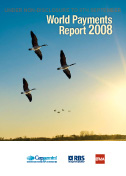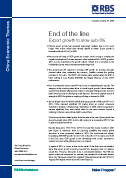 |
Global Transaction Services |
 |
Feedback |  |
Contact Me |  |
Home |  |
Previous Editions |  |
|
|
||||||||||
|
Global economy will impact exports as much as USD volatility After a 6-year decline, the U.S. dollar has been appreciating for most of 2008. While this should be of concern to U.S. exporters, which benefit from a weak dollar, the dollar's relative strength may not be the most important factor driving export sales going forward. Equally important will be the strength of the global economy, says Julien Seetharamdoo, Royal Bank of Scotland's London-based senior U.S. economist. "Exchange rates are important, because a weaker dollar makes U.S. exports more attractive," Seetharamdoo says. "But it's not just about the dollar." Although aided by the dollar's weakness, strong world demand for U.S. products and services from growing economies has driven the dynamic rise in U.S. exports in recent years, Seetharamdoo says. "That's why a global slowdown is a potential concern for the U.S. export sector." Impact of USD depreciation A slowing U.S. economy and resulting sharp interest rate cuts produced a steady depreciation of the USD since early 2002.
One of the best ways to express the value of the dollar is on a trade-weighted basis. Economists calculate the average of all dollar exchange rates using the volume of trade with each trading partner as a weighting method. On this basis, the USD depreciated 37% from January 2002 until March 2008. During the years of steady USD depreciation, U.S. exports thrived. From 2004 to 2007, for instance, U.S. exports grew at an average annual rate of 9%. And that growth pattern has continued into 2008. In fact, for the first half of this year, U.S. exports were up 20% year-over-year (not adjusting for price effects). U.S. export growth has been broad-based, benefiting sectors as diverse as agriculture, manufacturing and services, Seetharamdoo says. "The export sector is one of the few that has done well in the U.S. in recent months, and one of the major reasons why the U.S. has avoided falling into negative growth," he says. USD changing course? However, the dollar has begun to strengthen, appreciating on a trade-weighted basis by 8% since March 2008. The dollar remains weak relative to the long-term average. In September 2008, it was 17% below its trend strength on a trade-weighted basis since 1994. As such, the dollar can be expected to provide some mild support to U.S. exporters for some time yet. However, if the current appreciation trend continues, it eventually will almost certainly put a crimp in U.S. exports. Of course, forecasting exactly what the dollar will do is difficult, Seetharamdoo says. "We are in volatile times," he says. "Currency will be extremely volatile in the next few months because of the uncertainty of the economy." U.S. exporters need to be prepared for that volatility and consider hedging strategies to mitigate the potential impact on their businesses, Seetharamdoo advises. Seetharamdoo views a likely global economic slowdown this year and next as potentially just as detrimental to U.S. exports as a strengthening USD. The economies of emerging markets are holding up reasonably well, he says. However, others are beginning to limp. For instance, the economies of Europe are slowing rather sharply, led by housing market downturns in a number of the eurozone countries, he says. |
|||||||||||
|
Western-style credit reporting emerging in China The global economic slowdown is one of several factors shaping the development of Western-style credit reporting in China. As attractive as it has become for U.S. companies, doing business in a China that's still migrating to a market-driven economy presents many challenges. One of these — credit risk management — will become more important if, as expected, China's percolating growth numbers begin to only simmer as the forecasted global economic slowdown settles in.
Until recent years, commercial credit was literally a foreign concept in China, according to Tim Thomann, a Dallas-area board member of 3ACredit, a Shanghai-headquartered provider of credit reports and receivables management consulting and other related services in China. "A decade ago, most transactions in China were 100% secured transactions," Thomann says. But that's changing. "The Chinese government now understands that to compete in the global marketplace, they need to develop a credit market," Thomann says. "And they've had an initiative for the past five years to start focusing on that area." Indeed, as more foreign banks buy stakes in Chinese banks, local lending practices become more market-oriented and consumer finance takes off, China's financial services market is undergoing a marked change. Open account terms China is rapidly opening up to the world and has become a particularly attractive market to U.S. companies because of its strong economic growth and huge trade surplus. More and more U.S. products and services are sold to Chinese customers on open account terms. Thomann reports that open account trade in China has at least tripled in the past two years and will likely continue to expand for competitive reasons. With the movement away from secured transactions and in a climate of rising costs, tighter margins and slowing exports, U.S. companies trading with China bear increased credit risk — adding to the need for accurate and current credit information on Chinese companies. Local production and sales Another trend driving the need for Western-style credit reporting and management practices has been many large U.S. multinational companies making the strategic shift from exporting to China to moving production and sales there. In-country transactions in China pose an entirely new set of credit management challenges, Thomann says. As examples of hurdles he cites China's fledgling and untested legal structure around bankruptcies, the use of local letters of credit that don't observe UCP 600 rules, and unique check and draft payment practices. State of credit reporting industry The onset of a global economic recession is likely to create additional risk in doing business with Chinese companies that have come to expect double-digit growth — and may be more prone to sputter when their growth numbers dip into the single digits. For all these reasons, finding effective credit reporting resources in China is becoming critical to U.S. companies. Fortunately, a credit reporting industry has begun to emerge in China. Just a few short years ago, Thomann says, companies primarily had to work with attorneys to obtain reliable credit information on Chinese companies. However, he now estimates there are more than 3,000 credit reporting agencies in China. The problem for U.S. companies is that there still are no real standards for the information those agencies provide. Shopping for a provider Thomann says the credit reporting market is evolving rapidly, but in the meantime U.S. companies need to be particularly smart shoppers. He offers three simple pieces of advice:
If you need help in establishing effective credit management practices and resources for your business in China, be sure to consult with your RBS global trade finance advisor. If you would like further information about 3ACredit, you may contact Tim Thomann at [email protected], or visit www.3acredit.com. Please note that neither 3ACredit nor Mr. Thomann is affiliated in any way with RBS, which takes no responsibility for any information or advice either party may provide. The Royal Bank of Scotland plc is in certain jurisdictions an authorized agent of ABN AMRO Bank N.V. and ABN AMRO Bank N.V. is in certain jurisdictions an authorized agent of The Royal Bank of Scotland plc.
|
|
||||||||||
 |





